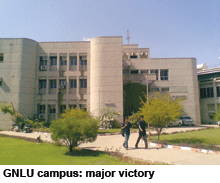Nine students of Gujarat National Law University (GNLU, estb. 2003), who filed a writ petition in the high court against GNLU challenging a varsity order detaining them in the third year of their five-year degree course, have won a major victory.
In a judgement delivered on October 17, Justice K.S. Jhaveri upheld the petition which challenged the unive-rsity’s detention rules. In his order, the learned judge set aside the rules of detention and ordered that the petitioners be provided immediate relief. GNLU was set up by an Act of the Gujarat state legislative assembly in 2003, and the chief justice of the Supreme Court is the visitor of the university.
The petition sought to quash and set aside rules of detention under which 22 third-year students were detained for a year for not having passed all their final term papers. According to the petiti-oners, new rules relating to detention had been framed without prior approval of the varsity’s general council, and that amendment of regulations suo motu is beyond the powers of GNLU’s director, Bimal Patel.
The petition argued that the director had acted arbitrarily and illegally because until 2011, all students who had failed one or more papers in the first three years were promoted and allowed to complete them in their fourth and fifth years of study. The petitioners contended that Patel had changed the rules and discontinued this convention arbitrarily and without notice to students or the general council, contrary to the provisions of the principal Act.
 Upholding the students’ plea, Justice Jhaveri ruled that the action of detaining the students by invoking provisions of Rule 67(n) of the Examination Rules, 2008 was illegal, improper and violative of the GNLU Act. “The Examination Rules, 2008 cannot be termed ‘regulations’ within the meaning of s.46 of the GNLU Act for the reason that the said Rules were neither placed before nor approved by the general council of the university,” ruled Jhaveri. The court also set aside an amendment of Rule 66 under which students had to complete the entire course within a maximum period of seven years as against eight years mandated by the Rule.
Upholding the students’ plea, Justice Jhaveri ruled that the action of detaining the students by invoking provisions of Rule 67(n) of the Examination Rules, 2008 was illegal, improper and violative of the GNLU Act. “The Examination Rules, 2008 cannot be termed ‘regulations’ within the meaning of s.46 of the GNLU Act for the reason that the said Rules were neither placed before nor approved by the general council of the university,” ruled Jhaveri. The court also set aside an amendment of Rule 66 under which students had to complete the entire course within a maximum period of seven years as against eight years mandated by the Rule.
GNLU students are jubilant that they successfully turned the law on Patel. Comments Pushkar Mehrotra, a fourth-year student of GNLU who was a petitioner in the case. “It was never our case that students be exempted from passing any subject. Our petition prayed that a well-established conv-ention should not be arbitrarily discontinued without proper debate and consideration by the general council. It has provided relief to all affected students and saved them a year. We will make sure we clear all papers within the stipulated period,” says Mehrotra.
The students’ argument is supported by Ahmedabad-based law lecturer and senior advocate Girish Patel. “A student could fail a paper on a particular day for a number of unforeseen reasons such as forced absenteeism, poor health, strikes, bandhs etc. She should be given the chance to write it another day. As long as all papers are written and passed prior to a degree being awarded, the public interest would be served,” says Patel.
However, GNLU director Bimal Patel, who has reportedly instructed the law university’s counsel to file an appeal against the single judge’s order, believes the cause of academic rigour will be served by the detention policy. “It’s a fact of life that the great majority of law graduates are very poorly equipped to contribute to improved practice or development of the law. That’s because of lax and too-liberal legal training. Students allow failed subjects to bunch in their final year and beyond, and pass them with intensive cramming rather than comprehension. The purpose of the detention policy is to discourage this practice,” says a GNLU professor allied with the director who preferred to remain anonymous.
Evidently both adversaries — students and faculty — have a good case which requires legal adjudication. That’s the raison d’etre of the justice system.
R.K. Misra (Gandhinagar)